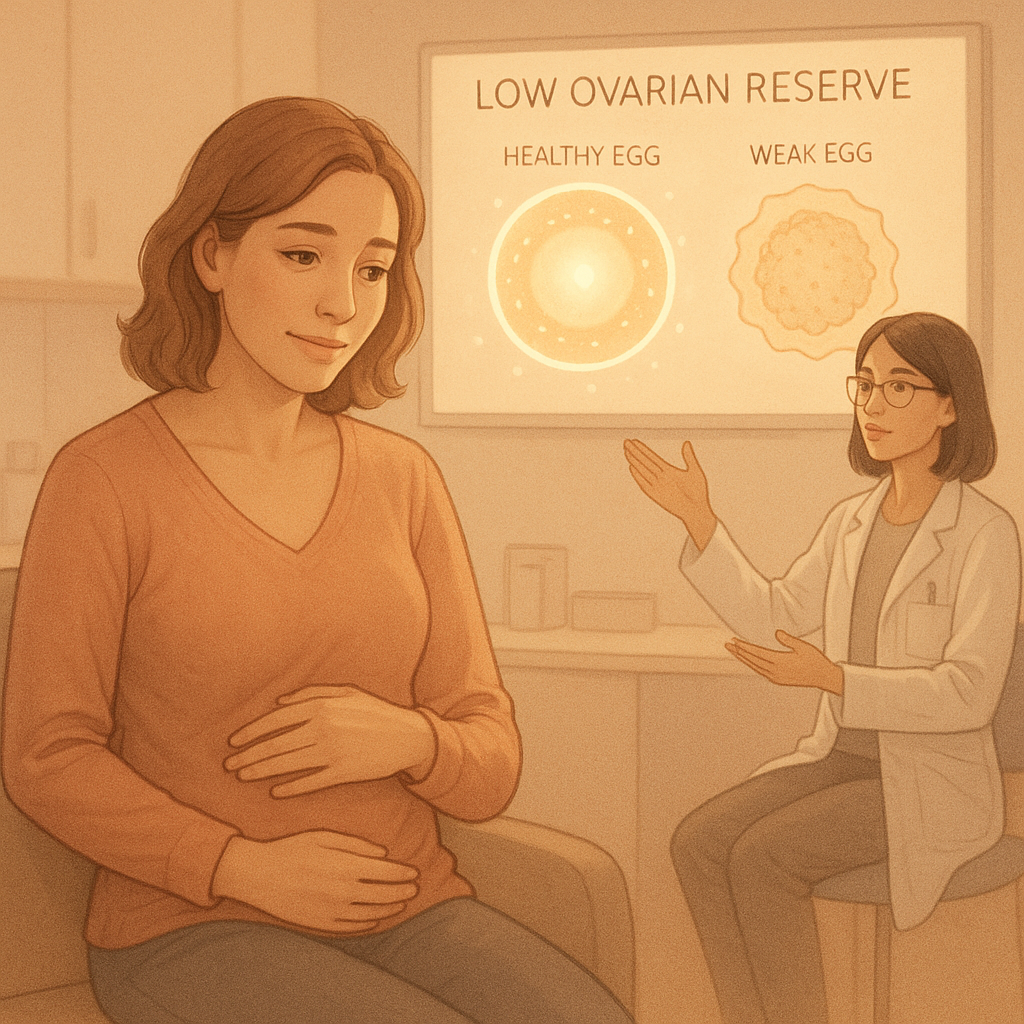
The idea of becoming a mother after menopause once seemed impossible. However, advancements in assisted reproductive technologies have made it achievable. Today, many women are asking, can you have IVF after menopause? The answer is yes thanks to modern fertility solutions offered by specialized centers like Cyprus IVF clinic, women in their 40s, 50s, and even beyond can pursue pregnancy with confidence.
With the help of in vitro fertilization, women who have entered or completed menopause are no longer limited by natural biological timelines. Techniques such as hormone replacement therapy and donor egg programs have opened new doors for hopeful parents. In this article, we will explore everything from IVF after menopause success rates to treatment processes, candidacy criteria, and the latest medical practices. Whether you’re in early menopause or have long passed it, understanding how IVF in menopause works could be the first step on your path to parenthood.
Is It Possible to Get Pregnant After Menopause with IVF?
Many women wonder, is it possible to do IVF after menopause? The answer lies in the revolutionary advancements of reproductive medicine. While natural conception becomes virtually impossible after menopause due to the loss of egg production, IVF offers an alternative route. Through techniques like hormone therapy and the use of donor eggs, women who have reached menopause can still achieve pregnancy. This method has opened new possibilities for those who once thought parenthood was no longer an option. Clinics such as Vita Altera IVF Center specialize in this area, offering hope and customized treatment plans tailored to each patient’s medical history and fertility goals.
Even though menopause marks the end of natural fertility, IVF technology can successfully bypass the limitations it imposes. With proper preparation, including hormone replacement and endometrial support, the uterus can still sustain a healthy pregnancy. The key is expert medical guidance, high-tech equipment, and personalized care. The success of IVF menopause procedures depends on factors such as the woman’s overall health, uterine condition, and the quality of donor eggs. In many cases, the chances of pregnancy post-menopause are comparable to those of younger women using the same method. Therefore, can a menopausal woman get pregnant with IVF? Yes, and many women are living proof.
How Menopause Affects Natural Fertility
Menopause significantly impacts a woman’s ability to conceive naturally. With the cessation of ovulation, the body no longer releases eggs, and hormone levels such as estrogen and progesterone decline sharply. This not only prevents natural fertilization but also affects the quality of the uterine lining, making implantation difficult. As a result, natural pregnancy becomes biologically unfeasible after menopause.
For women asking, can you do IVF if you are in menopause, understanding this natural fertility decline is crucial. The reproductive system undergoes permanent changes, making natural conception nearly impossible without medical intervention. However, the uterus may still function with the aid of medical support, making assisted reproduction a viable solution.
Can IVF Overcome Menopausal Challenges?
Yes, IVF can overcome many of the fertility challenges caused by menopause. Through medical protocols that include hormone replacement therapy, endometrial preparation, and the use of donor eggs, the body can be medically optimized to support pregnancy even after reproductive aging. This enables women to bypass the limitations caused by ovarian inactivity.
When considering IVF after menopause, the key is to create a pregnancy-friendly environment in the uterus. The treatment helps restore the hormonal balance required for embryo implantation and fetal development. Thanks to advanced techniques, can a menopausal woman get pregnant with IVF is no longer just a question, it’s a proven possibility for many.
Understanding Menopause and IVF Treatment
Menopause is a natural biological process that marks the end of a woman’s reproductive years. Typically occurring between the ages of 45 and 55, it signifies the cessation of menstrual cycles and a decline in hormone production, particularly estrogen and progesterone. As a result, natural conception becomes highly unlikely. However, thanks to modern medical advancements, particularly assisted reproductive technologies, post-menopausal women still have viable options. This includes IVF in menopause, a specialized approach that uses donor eggs and hormonal support to create a pregnancy-ready environment within the uterus.
Understanding the connection between menopause and fertility treatment begins with recognizing the hormonal shifts that take place during this phase. The ovaries no longer release eggs, but the uterus can still support a pregnancy with the right preparation. IVF protocols are adapted to suit menopausal patients by implementing hormone replacement therapy, endometrial preparation, and embryo transfer using donor eggs. For women who ask, can you do IVF if you are in menopause, this process provides a clear and achievable path. It’s a treatment option that has helped countless women experience the joy of parenthood despite the natural end of their fertility window.
What Is Menopause and When Does It Start?
Menopause is the natural biological process that signifies the permanent end of menstruation and fertility. It usually occurs between ages 45 and 55, though it may happen earlier or later depending on genetics or medical conditions. This transition is marked by a sharp decline in estrogen and progesterone levels, which affects various bodily systems and ends the ovulation cycle.
Although menopause ends natural reproductive function, it does not completely prevent a woman from carrying a child. For those asking ivf menopause, it’s important to understand that while eggs are no longer released, medical intervention can still enable pregnancy through IVF using donor eggs and hormone therapy.
How IVF Works in Menopausal Women
In menopausal women, IVF protocols are designed to work around the absence of ovulation. Since there are no viable eggs, donor eggs are fertilized with sperm in a lab. Meanwhile, the woman’s uterus is medically prepared with hormones to support embryo implantation and pregnancy. Once the uterine lining is sufficiently thick, the embryo is transferred.
This approach enables women who have already gone through menopause to become pregnant and give birth. For those asking is it possible to do IVF after menopause, the answer is yes—thanks to personalized medical plans, hormonal support, and advanced lab technologies, successful outcomes are increasingly common.
Hormone Replacement and IVF Preparation
Hormone replacement therapy (HRT) plays a vital role in IVF for menopausal women. It simulates the hormonal environment of a premenopausal body, primarily by administering estrogen and progesterone. These hormones help prepare the endometrium for embryo implantation by creating a receptive uterine lining.
This process begins weeks before embryo transfer and continues through early pregnancy to support implantation and development. Many women considering IVF after menopause rely on this method to increase their chances of success. Proper hormonal regulation ensures the body can support a healthy pregnancy despite being in a non-reproductive stage naturally.
IVF Options for Menopausal Women
For women who have reached menopause, the dream of becoming a mother no longer has to end with the natural decline of fertility. Thanks to medical innovation, there are several IVF options available that are specifically designed for menopausal or post-menopausal women. These options primarily involve the use of donor eggs, but can also include embryo donation or, in rare cases, the use of previously frozen eggs or embryos. Each of these methods is tailored to individual medical circumstances, hormonal needs, and uterine health.
One of the most common questions asked is, can you have IVF after menopause, and the options today clearly show that the answer is yes. Women can now choose from well-established protocols that include hormone replacement, endometrial preparation, and embryo transfer with donor materials. The selection process involves thorough screening, psychological support, and expert medical advice. For those searching for a safe and successful path to motherhood, these IVF solutions offer hope, flexibility, and personalized care. Thanks to high-quality fertility programs, including those offering IVF treatment in Cyprus, menopausal women are finding more options than ever before.
Using Donor Eggs After Menopause
Donor eggs are the most common and effective solution for post-menopausal women undergoing IVF. Since menopause halts natural ovulation, viable eggs from healthy, screened donors are fertilized with sperm in a lab. The resulting embryo is then transferred into the recipient’s uterus, which has been hormonally prepared to support implantation.
This option offers a realistic path to parenthood, especially for those who no longer produce their own eggs. It has helped answer the question many women ask: can a menopausal woman get pregnant with IVF. With a wide donor pool and rigorous matching systems, the chances of success are high and growing steadily each year.
Success Rates of IVF Post-Menopause
Success rates of IVF for menopausal women depend on various factors including age, uterine health, and the quality of donor eggs. Generally, women using donor eggs have comparable success rates to younger women undergoing IVF with their own eggs. The controlled nature of the process ensures a medically optimized environment for embryo development and pregnancy.
Those who pursue ivf after menopause are often surprised at how promising the success rates can be. With proper hormonal preparation and embryo selection, live birth rates are encouraging especially when treatments are performed at experienced fertility clinics with advanced laboratory capabilities.
Age Limits and Medical Requirements
While IVF is possible after menopause, there are still certain age and health criteria that must be met. Most clinics set an upper age limit, typically around 50–55 years old, although this may vary depending on individual health status and local regulations. A thorough medical assessment is essential to ensure the uterus can safely carry a pregnancy.
Patients interested in ivf menopause options must undergo evaluations such as blood tests, uterine scans, and cardiological screenings. These tests help determine eligibility and reduce risks. The goal is always to protect both the mother’s and baby’s health throughout the process, while offering a personalized and safe fertility journey.
Who Is a Good Candidate for IVF During or After Menopause?
IVF during or after menopause is a viable option for many women, but not everyone is automatically a suitable candidate. The ideal candidates are women who are generally healthy, have a functional uterus, and are emotionally and psychologically prepared for the IVF journey. Medical assessments are crucial, as cardiovascular health, hormonal balance, and uterine receptivity must be evaluated to ensure a safe pregnancy.
Women who are unable to conceive naturally due to age-related fertility decline, early menopause, or surgically-induced menopause often ask, is it possible to do IVF after menopause. For these individuals, IVF offers a medically supported and proven path to motherhood. Factors such as the willingness to use donor eggs, ability to undergo hormone replacement therapy, and absence of contraindicating health issues are all part of the candidacy criteria. Additionally, strong support systems and a clear understanding of the process contribute significantly to success.





